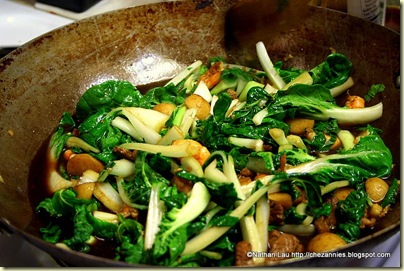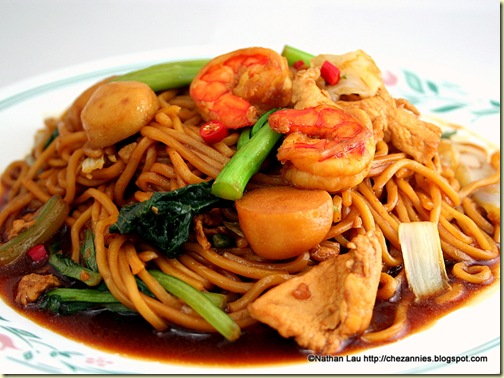This is the dinner I intended to make!
KL-Style Hokkien Mee
Over a month ago, a bad batch of noodles ruined my last attempt at making KL (that's Kuala Lumpur, in case you didn't know)-Style Hokkien Mee. Since my Mum is here visiting with us, we decided to make it again, this time verifying that the noodles were good. Here is our successful attempt.
I need my noodles!
There are certain foods that I ate a lot of growing up. Noodles are one of them, in all their different styles. It’s the one thing I miss more than anything while living in San Jose. I have not yet been able to find really good noodles here. Some have been decent but none are as good as the ones I can find at home. It’s no wonder that when I get home, my eating wish-list always involves so many noodle dishes.
When I’m home in KL, there is one noodle dish that I truly enjoy (ok, maybe more like 3 or 4 noodle dishes but this one is top of the list). You know how in the past, I said I would not eat Char Koay Teow anywhere but in Penang. Well, this noodle dish I’m talking about today is one I won’t eat anywhere but in Kuala Lumpur. This is the dish that everyone equates with KL. Any true KL-ite will tell you that the dark, thickly coated, BLACK looking noodle dish, KL Hokkien Mee (not to be confused with Penang Hokkien Mee) is the one thing you have to try when you’re in KL.
I have discovered a fresh noodle that comes in a 2-lb package here in my Asian grocery store called “Taiwanese noodles” and it seems to work pretty well for this dish. What I like best about this particular noodle is that it doesn’t need blanching or boiling ahead therefore cutting my cook time by a lot and lessening my need to wash one more pot (very important when you have kids running around demanding your time).
Taiwanese Noodles
Other noodles you can use as a substitute are udon noodles, or thin rice noodles (beehoon). They all work just as well. Not as good as the real thing but hey, these are all my “make-do” recipes. You’ll just have to make a trip to Malaysia to taste the real thing someday.
Another important ingredient in this noodle dish is the dark and thick soy sauce. I have not been able to find a really good brand here and so the closest I have come to finding one that works is the Koon Chun Thick Soy Sauce which you should be able to find at the Asian grocery store. I love this sauce as you can use it for many different dishes. You will find me using this in my Char Koay Teow, Bah Kut Teh, chicken and pork dishes and marinades. So buy it and come back to look for different ways to put this sauce to use.
KL-Style Hokkien Mee
adapted from “Cook Malaysian”
Ingredients:
6 tbsp oil (lard is better if you have it)
8 cloves garlic, minced (about 5 tbsp)
2 tbsp thick soy sauce
2 tbsp soy sauce
1 tsp sugar
1 tsp salt
1 ½ cups water
½ tsp ground white pepper
6 oz pork tenderloin, sliced (chicken can be used too)
6 oz medium-sized shrimp, shelled and deveined
6 oz fishballs (cut in half), optional
1 (1/2 lb) bunch of mustard greens (yu choy) or cabbage, washed and cut into 1 ½ inch lengths
Method:
- Mix black soy sauce, soy sauce, sugar and salt with the water.
- Heat oil in a wok or large frying pan and brown the garlic.
- Add the pork and fry for a minute till it is slightly cooked, then add the fishballs and shrimp. Fry for another minute until shrimp is partially cooked.
- Add the soy sauce mixture and bring to boil.
- Add mustard greens and cover pan to wilt the vegetable.
Pork, Fishballs, Shrimp and Veggies for KL-Style Hokkien Mee
- As soon as the greens have turned bright green, loosen noodles and add to the wok. Toss noodles around the sauce to coat noodles with sauce. Continue to turn noodles around until most of the sauce has been absorbed and noodles are looking dark and sauce has thickened. Add the white pepper and adjust seasonings.
- Serve with sambal belacan or sliced chillies.
KL-Style Hokkien Mee
Now that's more like it! It's still not as black or as thick as I I like it, but you can only do so much on an electric stovetop compared to a high-output gas burner. Anyhow, we all really enjoyed this dish.
Cheers, Annie
If you liked this article, won't you consider Subscribing by Email to receive all our latest articles in your Inbox? From time to time, we will run giveaways on this site. As a verified email subscriber, you will be automatically entered in each drawing!
Hungry for more Malaysian noodle dishes? Click below!
Pumpkin Mee with Prawns Recipe
7 Tips for Making Mouth-Watering Char Koay Teow
Hokkien Udon Mee from Babe in the City
Kuala Lumpur Black Hokkien Mee from Lily's Wai Sek Hong






22 Comments:
What a healthy dish! It looks so good!
Yum.. I love KL Hokkien Mee. I don't remember the place in KL that I had Hokkien Mee.. it was so good... especially they cook it with pork fat... I know it's unhealthy but it tastes really good!
This dish looks amazing and something the entire family will eat. Thank you for the recipe; I'm definitely going to try it.
Love this too, in Penang it's called Hokkien Char and can't eat it without sambal belacan, you are making me hungry.
This is another of the dishes I tasted for the first time when I traveled to Malaysia. I came home from that country an absolute noodle-holic!
Oh....KL tai lok mee! My hubby's most favourite mee (beside Penang Indian mee which we will only eat in Penang). Lard is the KEY ingredient in this recipe. But we always feel so guilty after eating it! Hahaha...! Your mee looks so delicious! 好棒啊!
@vanpham - thanks!
@mycookinghut - I love it with those little bits of fried pork fat...mmmm...
@dp - you're welcome! Be sure to let us know how it turns out!
@rasa - mission accomplished LOL
@Lydia - what was your favorite noodle dish?
@food for tots - must have lard...just don't eat it too often!
Hey Nate and Annie, have you tried the noodles from Yuen Hop in Oakland? Wondering how they stack up. That food looks too good.
@Robert - yes, we have tried the noodles from Yuen Hop. We've also used their fresh won ton skins. Both are great. It's so nice to have a noodle factory making fresh noodles locally. We used to go to this one shop in Honolulu's Chinatown all the time. *sigh* We really miss that.
Guys, you made me so very happy seeing this dish! It's one of my all time favorites with a nice big dollop of sambal on the side ;)
I'm going back to KL/Penang for CNY next year, can't wait to have my feast on the local fares!
@elaine - thanks, I'm glad you liked it. We're jealous that you get to go home to Png for CNY. Such yummy foods!
Hokkien Char!!! Oh my... I missed this too. In Belgium is difficult to find quality fresh noodles :-( Sometimes the asian shops & minimarts stored almost dried yellow noodles arghhh. They don't bothered to thrash it or replace with new ones. They do have in vaccum packed like Amoy or Suziwan brands in major supermarkets but I preferred the yellow mee..sigh.. Now, I wonder if our M'sian foodies in London have this problems... Thanks for sharing Annie! Love it.Even my son loves it when we toook him out to eat this Hokkien Char in Penang!
you're so spot on about KL's version of this noodle. you just cant it anywhere outside KL :p
oooo... looks delicious.. could you make my share too please ;D
Love the vibrant colors.. Yum.
@pixen - thanks for the nice comments!
@babe_kl - I know. Even though this version is nice, nothing beats the real thing!
@cumi & ciki - sure thing!
@jude - thanks!
yummylicious - I know where to get the recipe now. I will definitely try it one day.
@mysimplefood - hey, let us know how it turns out!
Yum, I love those taiwanese noodles and this looks like a great use for them.
@gaga - what other dishes do you use them in?
I lived in KL and lived in San jose. I know what you experiece.
Thank you for your effort. May God bless you.
Leong
Another great recipe from Nate and Annie! This was quick and simple to make and we really enjoyed it. We added some sambal oelek at the start and then added as much of my homemade chilli oil as we wanted at the end. I used gai lan and spring onions as my greens. Unfortunately I couldn't get the fishballs and had to make do with what I had in the house, so we used chicken and lop cheong for the meat component. Thanks for sharing this tasty dish!
Post a Comment